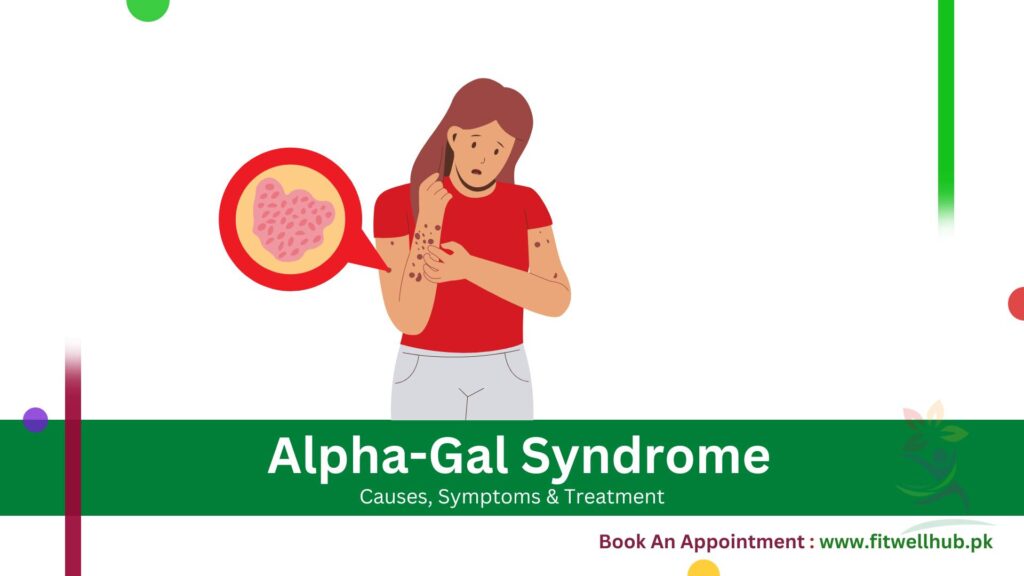Alpha-gal syndrome is a food allergy caused by eating red meat and other products made from mammals, stimulated by a Lone Star tick bite. The allergy is caused by a carbohydrate, namely galactose-α-1,3-galactose (alpha-gal), which is present in most mammals but absent in humans. When this tick bites a person, alpha-gal is incorporated into their bloodstream, causing the immune system to produce antibodies.
Quick Links
ToggleConsumption of red meat containing alpha-gal can stimulate an allergic reaction. The symptoms often appear late, generally occurring 3 to 6 hours after consuming the allergen. Therefore it makes it difficult to diagnose. The disorder can range from mild reactions, such as hives and gastrointestinal discomfort, to severe anaphylaxis, which is a life-threatening condition.
Symptoms
Tick-bite allergy has a variety of symptoms that can vary in severity. The late beginning of symptoms, generally 3 to 6 hours after consuming red meat, makes this allergy unique.
Itchy Skin or Hives: It is the first visible sign of an allergic reaction to alpha-gal. The skin becomes red, raised, and intensely itchy.
Gastrointestinal Symptoms: Nausea, vomiting, and diarrhea are most common in those suffering from alpha-gal reaction. These symptoms usually coexist with other allergic responses and can be highly severe.
Anaphylaxis: In some cases, this condition can cause anaphylaxis. It is a severe and probably life-threatening reaction. Its symptoms include difficulty in breathing, a drop in blood pressure, and loss of consciousness.
Difficulty in Breathing: Due to swelling or other allergic responses respiratory issues increase that cause life-threatening complications if not treated properly.
Anaphylaxis: This severe, allergic reaction can cause a remarkable drop in blood pressure, and difficulty in breathing. It requires prompt medical treatment.
GET IN TOUCH
Book an appointment
When to See a Doctor
If you are facing these symptoms a few hours after eating red meat, it’s essential to get medical treatment. Early diagnosis and effective management are crucial to prevent severe reactions, including anaphylaxis. If you are susceptible to this allergy, then consult with your doctor who will perform tests to confirm the diagnosis and provide guidance on managing the condition. At Fitwell Hub we have specialised doctors who help you to diagnose and treat this condition. Visit FitwellHub’s services for more information.
Causes
Tick-bite allergy is an allergic reaction of alpha-gal, caused by a carbohydrate found in red meat. The allergy is caused when a Lone Star tick bite incorporates alpha-gal into the bloodstream.
- Lone Star Tick Bites: The main cause is a bite from the Lone Star tick, which incorporates alpha-gal into the bloodstream.
- Consumption of Red Meat: Eating red meat, like beef, pork, or lamb, can stimulate an allergic reaction in individuals with alpha-gal syndrome.
- Mammalian-Derived Ingredients: Several foods and products, like gelatin or dairy, also contain alpha-gal and cause allergic reactions.
- Eating Food Cooked in Mammal Fat: Foods cooked in mammalian fat contain alpha-gal, stimulating allergic reactions in those with the syndrome.
- Use of Certain Medications With Mammalian Gelatin: Medications containing mammalian gelatin can cause allergic reactions. These medications increase individuals’ sensitivity to alpha-gal and require careful management.
Risk Factors
Several risk factors can increase the risk of developing this condition:
1- Geographical Location:
Living in regions where Lone Star ticks are common, like the southeastern United States, the risk of alpha-gal syndrome increases significantly. These ticks are the main carriers of the alpha-gal molecule, making inhabitants more vulnerable in these areas.
2- Outdoor Activities:
Engaging in outdoor activities like hiking, camping, or hunting in tick-infested areas increases the risk of tick bites. Exposure to tick habitats, particularly in warm seasons, increases the risk of developing tick-borne allergy.
3- Previous Tick Bites:
Having multiple tick bites raises the chance of developing this condition. Frequent exposure to alpha-gal from tick bites can excite the immune system, making it more likely to react to the molecule.
4- Red meat Consumption:
Regular consumption of red meat can increase the risk of developing allergic reactions if the body is sensitive to alpha-gal.
5- Lack of Awareness:
Lack of awareness of the risk factors associated with tick bites and alpha-gal can cause unintentional exposure and delayed diagnosis.
6- Seasonality:
In warmer months ticks are more active therefore the risk of tick bites and tick-borne allergy increases.
7-Animal Exposure:
Frequent contact with animals, particularly in environments where ticks are common, increases the risk of biting and developing the syndrome.
Complications
This condition can cause various complications, mainly due to the risk of severe allergic reactions and the effect on dietary choices.
1- Anaphylaxis: It is the most severe complication that requires prompt medical attention. If left untreated, it can be fatal.
2- Dietary Restrictions: Individuals suffering from this condition must avoid red meat and some animal-derived products that can cause nutritional challenges.
3- Social and Emotional Impact: Managing the condition can be difficult and socially isolating because it requires constant care regarding food choices.
4- Difficulty in Diagnosing and Managing the Condition: The delayed beginning of symptoms causes diagnosis and management challenges.
5- Increased Risk of Severe Allergic Reactions Over Time: The sensitivity to alpha-gal increases, and causes more severe reactions with each exposure.
Prevention
To prevent this syndrome you need to avoid tick bites and be careful in making food choices.
- Use Tick Repellent: Use Insect repellent on your body when spending time outdoors, especially in areas known for ticks.
- Wear Protective Clothing: Cover exposed areas of your body when you are walking in wooded or grassy areas.
- Perform Tick Checks: After spending time outdoors, regularly check your body for ticks.
- Avoiding High-Risk Areas: Limit time spent in areas where ticks are widespread, especially during peak seasons.
- Maintaining a Tidy Yard: Keep your yard clean and free from tall grass and brush, which can harbor ticks.
- Using Permethrin-Treated Gear: Wear clothing and tools treated with permethrin, an insect repellent that can kill ticks on contact.
Using these prevention measures can help you to reduce the risk of contracting tick-borne allergy. These measures, offer wide protection against tick bites and the subsequent risk of this condition. Fitwell Hub offers a Healthy Elite Lifestyle Program that includes strategies for disease prevention. Learn more about prevention at FitwellHub.
Diagnosis
The condition is diagnosed by a combination of patient history, symptoms, and specific blood tests that can identify antibodies to alpha-gal. If you face late allergic reactions after eating red meat, your doctor may suspect alpha-gal syndrome and recommend the following tests:
- Blood Test
- Skin Prick Test
- Food Challenge
- Medical History Review
- Symptom Analysis
Blood Test: A blood test is performed to measure the levels of antibodies to alpha-gal in your system.
Skin Prick Test: A skin test is performed to check if you have an allergic reaction to alpha-gal.
Food Challenge: In some cases, your doctor may recommend a food challenge test under medical supervision to confirm the diagnosis.
Medical History Review: Your doctor will evaluate your medical history, including any recent tick bites and dietary habits, to identify potential stimulators.
Symptom Analysis: Comprehensive documentation of symptoms and their timing related to food intake is essential for diagnosis. Fitwell Hub’s lab offers wide testing services for alpha-gal syndrome. Learn more about FitwellHub Lab.
Treatment
There is no cure for this disease, but the condition can be managed by avoiding stimulators and treating symptoms.
| Tips | Description |
| Avoid Red Meat | Completely avoid alpha-gal-containing products and red meat. |
| Consult an Allergist | Regularly seek help from an allergist for personalized management plans and allergy testing. |
| Keep a Food Diary | Maintain a record of foods you consume to identify stimulators and track reactions. |
| Educate Family and Friends | Inform your family members and friends about your condition and the importance of avoiding stimulators in social situations. |
Medications
There are several medications used to effectively manage symptoms of alpha-gal syndrome:
- Epinephrine Auto-Injector: Use this for emergency treatment of anaphylaxis.
- Antihistamines: Use these to relieve mild symptoms such as hives or itching.
- Corticosteroids: Use these to alleviate inflammation in severe cases.
- Beta-Blockers: Avoid beta-blockers because they can worsen anaphylaxis.
- Leukotriene Modifiers: Use these to manage allergic symptoms by blocking substances that cause inflammation and bronchoconstriction.
- Montelukast: Use this leukotriene receptor antagonist to reduce respiratory symptoms linked with allergic reactions.
At Fitwell Hub Pharmacy we provide the necessary medications for managing alpha-gal syndrome. Visit FitwellHub Pharmacy for more information.
GET IN TOUCH
Book an appointment
Frequently Ask Questions (FAQ’s)
The disease usually appears as late allergic symptoms, such as hives, stomach pain, or dyspnea, following consumption of red meat or alpha-gal-containing items.
Over time, the condition may become better, but it usually doesn’t go away permanently. Avoiding stimulators is crucial for managing symptoms.
There is no natural cure for this disorder. Its effective management includes strict avoidance of alpha-gal-containing products and red meat.
To avoid getting this disease, you should prevent tick bites by using insect repellent, wearing protective clothing, and performing regular tick checks.
This is not genetic. A tick bite stimulates an allergic response to alpha-gal, a sugar molecule found in red meat.














